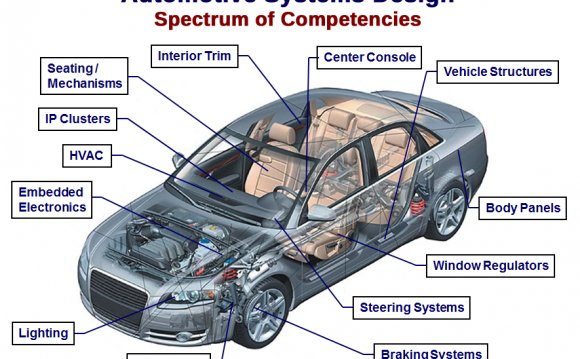
Automotive design engineers create or improve motor vehicle bodies, parts and accessories. Designers are expected to complete a bachelor's degree program in industrial design or a related field, such as mechanical engineering.
| Careers | Industrial Designer | Mechanical Engineer | Electrical Engineer |
| Required Education | Bachelor's degree | Same | |
| Projected Job Growth (2012-2022)* | 4% | 5% | |
| Average Annual Salary (2013)* | $65, 630 | $79, 170 | $93, 380 |
Source: *U.S. Bureau of Labor Statistics
Career Information for Automotive Design Engineers
Automotive design includes industrial designers, mechanical engineers and electrical engineers, who collectively develop or improve motor vehicle structures, accessories, engines and related systems. Commercial and industrial design jobs were projected to increase by 4% from 2012-2022, according to the U.S. Bureau of Labor Statistics (BLS, www.bls.gov). Meanwhile, data from the BLS indicates that mechanical engineers may experience a 5% growth rate, and electrical engineers should also see 5% growth over the same period. The BLS reported that the average salary for commercial and industrial designers working in motor vehicle parts manufacturing was $65, 630 in May 2013. Mechanical engineers working in the same industry earned an average salary of $79, 170 in 2013. Electrical engineers were paid an average of $93, 380 that year, based on data from the BLS.
Requirements to Become an Automotive Design Engineer
Automotive design engineers combine creative aesthetics with a practical understanding of engineering. Designers often interact with mechanical and industrial engineers to create designs feasible for production, and have knowledge of raw materials, engineering techniques and production processes. Automotive design engineers draw by hand and utilize computer design software.
They are expected to complete at least a bachelor's degree program. Relevant fields include mechanical engineering, electrical engineering, industrial design and automotive design. Coursework includes design principles, sketching, 3D modeling, design presentation and computer-assisted design. Art and industrial design history and engineering technology courses can provide a beneficial foundation. Employers expect to see a portfolio of a designer's work, which can be developed over the course of a degree program.
RELATED VIDEO












